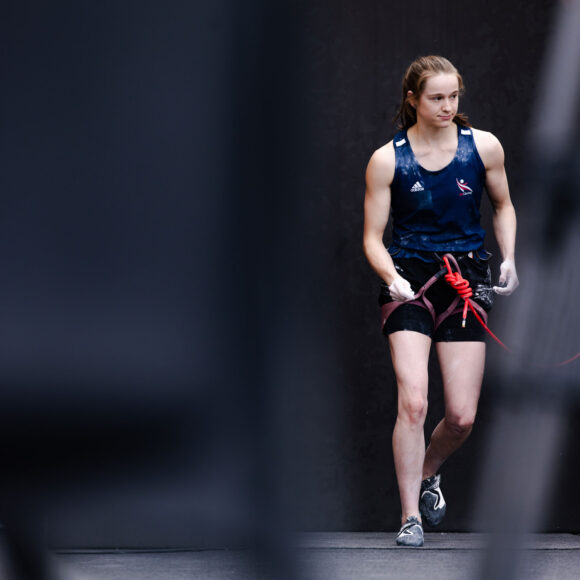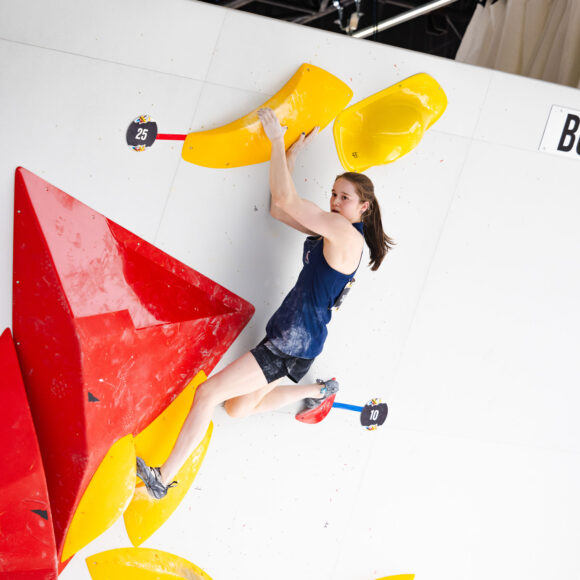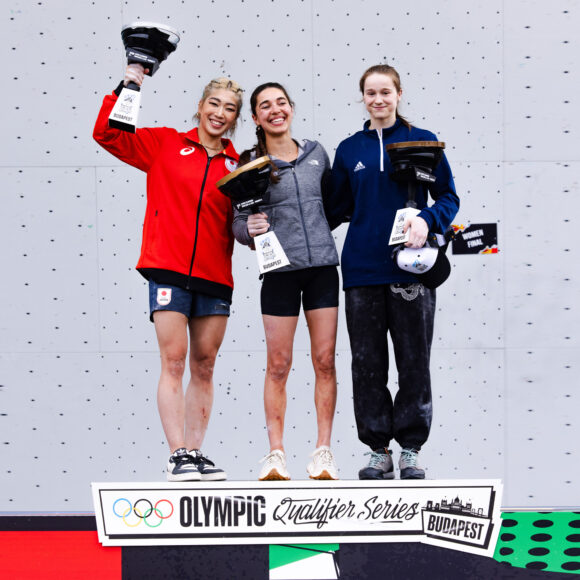
Dreams do come true for Depot Climbing athlete Erin McNeice
Hot on the heels of a debut senior competition season in 2023, Depot Climbing Athlete Erin McNeice has qualified for the greatest show on earth, the Paris 2024 Olympics.
The epic rise doesn’t start there though, one of the UK’s newest Olympians is competing in the Olympic Games under a decade since their first taste of national competition.
Having deferred a place to study at university in Sheffield to focus all efforts on establishing a senior competitive climbing career and have a shot at the Olympics, it’s all seemingly coming up Erin right now.
Fresh off the mats of the Budapest Olympic Qualifying Series, we spoke with Erin about how it feels to be an Olympian, how long it might take to sink in and what her hopes are for life after the Games.
Erin joins Depot Climbing Read Molly Thompson-Smith: Olympian
Well, congratulations! How does it feel to have a ticket to Paris 2024?
It feels very surreal. I think it’s only just starting to sink in. When I imagined going to the Olympics, I was definitely a little older as it would give me a bit more time to establish myself on the international circuit. But I’ve made it now, and I’m motivated to compete in Paris in my best possible form.
What do the Olympic Games mean to you?
I think everyone else would agree that the Olympic Games is an athlete’s dream. It’s the highest stage that you can compete at and it’s an honour to have the opportunity to prove myself in this massive competition, and I hope I can do myself and everyone who supports me proud.
Can you begin to describe how the weekend in Budapest felt?
It started off a little choppy with boulder qualification. The conditions were very intense and I didn’t prepare for them, but I managed to compose myself and prepare better for lead qualifying. I got joint second on the lead route and progressed safely into the semis.
Coming into the comp, I was trying not to think about the Olympic ticket, I just wanted to make the finals. When I made finals, I was overjoyed! It was the most stress-free round I’ve ever climbed and ending the comp in 3rd felt like a dream.
How did you celebrate?
After making finals, I went out to dinner with my family. I knew I’d got an Olympic ticket, but I still wanted to put all my fight in for the finals so I went home early and prepped for that.
After I got the 3rd, I was able to celebrate properly. I can’t describe how lovely it was to have my coaches, my family and my friends surrounding me for this competition. It’s one I’ll never forget.

Find out more about Erin in our People of Depot Climbing video series

You are still relatively new to the competition scene, having competed on the senior circuit for the first time in 2023. How are you managing the meteoric rise? (do you have a team of people to help? Coaches, family, friends etc.)
Honestly, it’s been incredibly surreal and also overwhelming in its own way. I competed in 2023 but my boulder, and, especially my lead climbing, wasn’t at the level it needed to be. I knew I’d improved a lot and pushed myself to my absolute limit in the winter season, but you never really know where you are coming into a new season.
Other competitors are pushing just as hard, so it’s hard to make up the gaps when you’re just coming onto the stage. When I got my first few good results, I was so happy but also found it hard to believe. My support system (my coaches, my parents and my brother) really helped me have faith in myself, and believe that I belong at that level.
If you could pass on one bit of advice to the Erin who was about to step onto the mats at their first competition, what would it be?
It’s incredibly cliché but just enjoy it. I really wish that I could say this to little Erin because I still struggle with it now. Everybody makes mistakes, and your performance doesn’t have to be perfect. I’d tell her to smile more because you can be fully focused and happy at the same time.
What have been the biggest challenges on the road to the Olympic Games?
For me, the biggest challenge was time. After the 2023 season, I had so many areas of weakness. I had 6 months to catch up to everyone else. I pushed myself to the edge both physically and mentally. It was easily the hardest 6 months of my life, especially because of my previous results.
It was hard to have the belief since I hadn’t yet got the results yet. I was spending 7-9 hours a day working at my max, not knowing if success was a guarantee. I just had to have 100% faith in the process.
What do you hope to take away from the experience of your first Olympic games?
A massive part of the experience is the climbing, and I’m so unbelievably excited to climb at Paris 2024. But because of the status of the competition, there are so many other aspects that make up the experience. I’m not sure what exactly it will be like, but I’m looking forward to taking it all in. And I couldn’t be happier that I get to share it all with the coaches and my teammates.


Since finishing 5th in Keqiao in April 2024, you’ve been unstoppable, what is the biggest contributor to your form since then?
I feel I’ve come a long way since Keqiao. There was a lot of work on areas that were highlighted from that competition and I feel pretty confident in those areas now. The bouldering competition in Keqiao and the lead climbing competition in Wujiang were a few days apart.
After placing 5th in both of those, I realised that my bouldering and lead climbing were pretty much equal and I knew this would be really important for the Olympics, so I made sure to keep focussing on both in training.
It benefitted my performance in the Olympic Qualifier Series a lot because I really do see myself as a combined athlete.
Following up an Olympic Qualifying Series event with a Boulder and Lead Climbing World Cup in Innsbruck just days later must be a challenge. How do you handle the challenges of a rigorous competition circuit and how have the Olympic events shaped your season?
I decided not to compete at Innsbruck. I would be going purely to get more experience, but my coaches and I felt as though I’d gained enough experience from the OQS rounds.
I climbed 6 rounds in each competition, and I learnt so much from each of them. My body is sort of used to the quick turnaround between rounds already because of the off-season.
Winter training is often more brutal than comps in terms of volume, so none of the rounds have felt too exhausting (yet…). Because of it being an Olympic year, there’s a lot more focus on that big comp. Hopefully next year I can focus on my goals in the World Cups.
What will your preparation between now and August 5th look like? Will it be high-intensity training? How many rest days have you got before Paris 2024?
I’ve made the difficult decision to have my next competition be the Olympics instead of the World Cups. I think there are areas of weakness in both my boulder and my lead climbing. I will focus on those so that I can go into the Olympics confident that I’ve trained hard and am strong.


How many rest days have you got before Paris 2024?
I’ve got a little bit of a de-load before the Olympics, so I can feel fresh for qualification. But the actual schedule for the competition is pretty relaxed. It’s one day off and one day on, so I will most likely only have one day of rest before.
What would you like your Olympic legacy to be?
For myself, I just want to go in knowing that I’ve done everything I can to prepare and also knowing that I’m the best I’ve ever been. I want to try as hard as I can and enjoy every second of it. I hope I can make people proud and maybe inspire a few.
Have you given any thought to that deferred University place? Or do you think climbing will continue to take precedence over the coming years?
I’ve definitely given thought to the university place, as it was a very hard decision to defer. I really enjoy education and I miss it a lot. But I also know I’m not at the level I want to be yet in my climbing.
This winter training season will likely be much like the last, and those 8-hour days don’t leave much leeway for studying. Also, if all goes well, I’d like to do the whole World Cup season next year. That amount of travel would also make uni pretty difficult.
If you could pass on one piece of advice to climbers of any ability and stage of their journey, what would it be?
I’d tell them to use what they enjoy as a tool. If you’re training for a project or a trip etc. there is always going to be a part of training that you don’t enjoy as much. But, for me, climbing with other people makes the journey less lonely and makes me try harder.
If I pair a joint session with a session I maybe don’t like as much, it makes it easier. Allow yourself to do the things you enjoy because, above all, the most important part is enjoying the journey.
Climbing will be taking place at the Paris Olympics between the 5th and 11th of August 2024. Team GB are fielding the maximum 4 climbing competitors at the Games, with Toby Roberts and Hamish McArthur representing the men’s athletes.
The other female athlete competing in climbing for Team GB at the Games is Depot Athlete Molly Thompson-Smith who also qualified via the OQS event.
Depot Climbing would like to wish every athlete representing Team GB at the Olympics in Paris the very best of luck.
You can watch coverage on the BBC, Eurosport & Discovery+
Follow Erin Here

How did the OQS Event work?
The OQS Series was held over 2 rounds, the first in Shanghai (16th-19th May), followed by a second in Budapest (20-23rd June) where it was not just Sport Climbing in focus, but numerous other sports such as Breaking, Cycling BMX Freestyle and Skateboarding.
The events are set up as a festival of sport and culture, with a focus not just on athletic achievement, but culture in the way of music, fashion and art. Fans and athletes are both able to compete in their fields but get the opportunity to participate and spectate the range of sports taking place. Across the sports, over 150 athletes booked their tickets to Paris.
To qualify from the event, climbers performed in both bouldering and lead, having their combined scores across both events count towards their final total in a bid to qualify.
In bouldering, athletes must top each problem (boulder) in the least amount of attempts, with each competitor attempting 4 boulders, to get the best score from a total of 100 points that they can. Every fall from the wall results in a 0.1-point deduction. This score is then taken into the lead round…
…where athletes must climb as high as possible in one attempt within an allotted time (6 minutes) on a 15-meter overhanging wall. Points are progressively given for reaching holds on the wall, with the top hold being worth 100 points.
The boulder and lead score are added together, to give a total score out of 200 points. The highest total wins!
Categorised in: Athlete Updates, Community
This post was written by depotadmin
